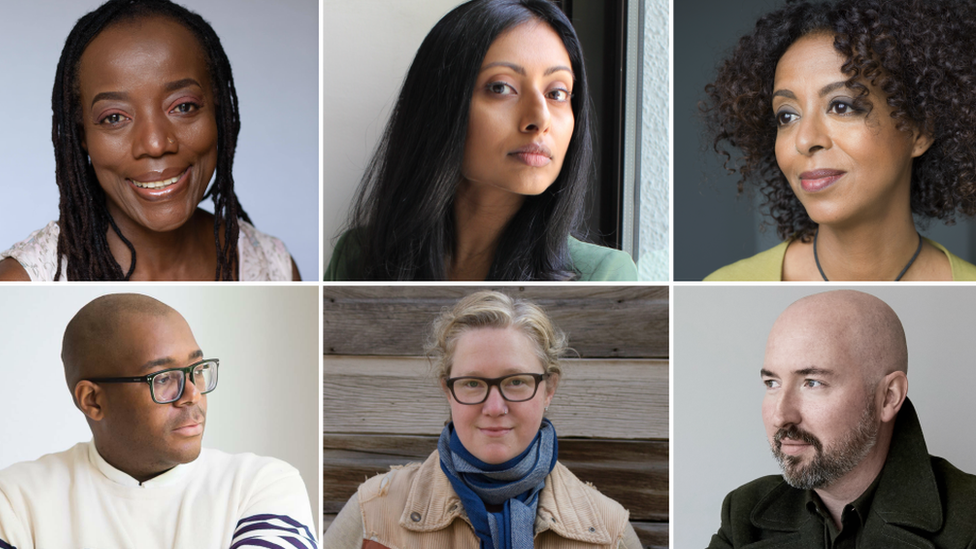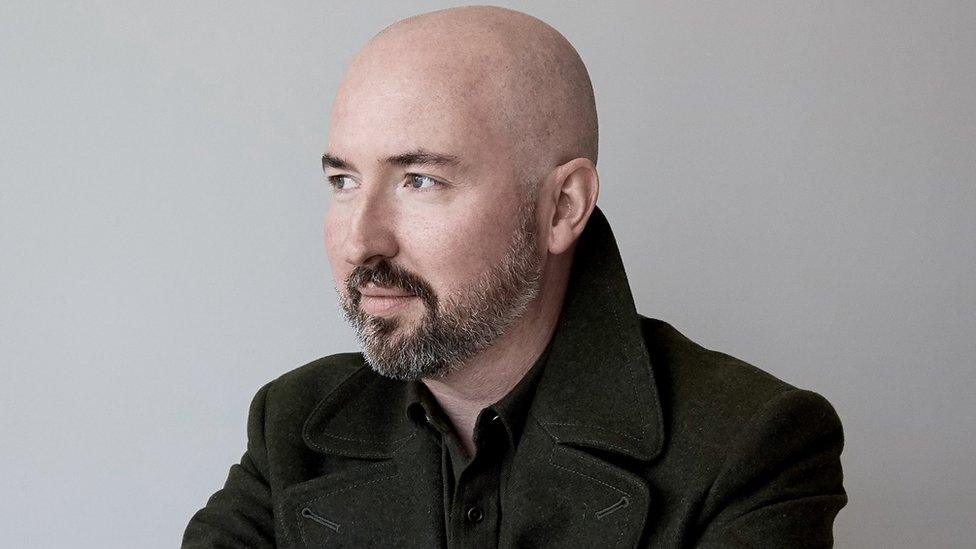Booker winner Douglas Stuart remembers 'proud' Glaswegian mother
- Published
Douglas Stuart 'blown away' by Booker win for Shuggie Bain
Scottish author Douglas Stuart has paid tribute to his "wonderful" Glaswegian mother, who inspired his Booker Prize winning novel.
He described her as a "proud, hardworking, generous woman" who struggled with alcoholism in the 1980s.
The illness eventually led to her death when Stuart was a teenager.
His novel Shuggie Bain took the 2020 gong on Thursday following a unanimous decision from judges - who said they had only taken an hour to decide.
Stuart described the book as a "love story" between a mother - Agnes Bain - and her son Shuggie.
It tells the story of Agnes' descends into despair and her struggles with alcoholism following the breakdown of her marriage. While most of her children are driven away by her deterioration, Shuggie remains to help - while suffering huge personal problems of his own.
Stuart said that while Agnes was "totally fictitious", his own mother's struggles were "at the heart of the book".
"My mother was a wonderful mother," he said. "I grew up in 80s Glasgow but my mother suffered from alcoholism. She was a very proud, hardworking, generous woman - but she was hurt and she was deeply unwell.
"Addiction sort of marred my entire childhood - it wasn't that there was drink in the house every single day, but we were always sort of anticipating or getting over it.
"When I was about 16 my mother died of her addiction and so writing the book was a way of conjuring her back up and putting that feeling on the page and making us feel seen."

Scottish authors and the Booker prize shortlist
1969 - "The Public Image" by Muriel Spark
1969 - "From Scenes Like These" by Gordon Williams
1981 - "Loitering With Intent" by Muriel Spark
1982 - "An Ice Cream War" by William Boyd
1989 - "A Disaffection" by James Kelman
1994 - "How Late It Was How Late" by James Kelman -WINNER
1994 - "Beside The Ocean Of Time" by George Mackay Brown
1999 - "Our Fathers" by Andrew O'Hagan
2001 - "Hotel World" by Ali Smith
2005 - "The Accidental" by Ali Smith
2014 - "How To Be Both" by Ali Smith
2016 - "His Bloody Project" by Graeme Macrae Burnet
2017 - "Autumn" by Ali Smith
2018 - "The Long Take" by Robin Robertson
2020 - "Shuggie Bain" by Douglas Stuart - WINNER

Big party
Stuart, 44, is the second Scot to win the Booker Prize, following James Kelman in 1994 for How Late it Was, How Late.
Had his mother been alive to hear the news, he said she would have "had her best coat on and wanted to go for a big party".
He told BBC Scotland's The Nine: "She'd have thought she'd have won, it's just wonderful.
"I was really heartened to hear that it was a unanimous decision - which I think is probably the greatest thing I could hear.
"The other writers' books took me to all the corners of the world and into lives that I would never see and that is the power of literature - our ability to travel - and any one of them could have won."

This year's nominees (clockwise from top left): Tsitsi Dangarembga, Avni Doshi, Maaza Mengiste, Brandon Taylor, Diane Cook and Douglas Stuart.
Stuart moved to New York for work, where he now lives with his husband - but said his life in Glasgow is a huge source of inspiration for his writing.
He is already working on his next novel, which is about two boys from the east end of the city who fall in love, but are separated by gang lines and sectarian violence.
He said: "My Scottishness is not a coat - it's not something you can take off and leave behind. It informs everything I do in the world and how I carry myself and everyone who meets me understands me as Scottish. I think it will be that way until I die.
"Glasgow is an amazing city to draw inspiration from because it really packs in the humanity. I love the city because it is an incredibly empathetic place but it also places opposing feelings close together - there is sadness, there is joy, there is violence and tenderness.
"[My next novel] is hugely different, but it still celebrates working-class Glasgow because that's what I love. I'm excited for you to meet these characters."
- Published20 November 2020
